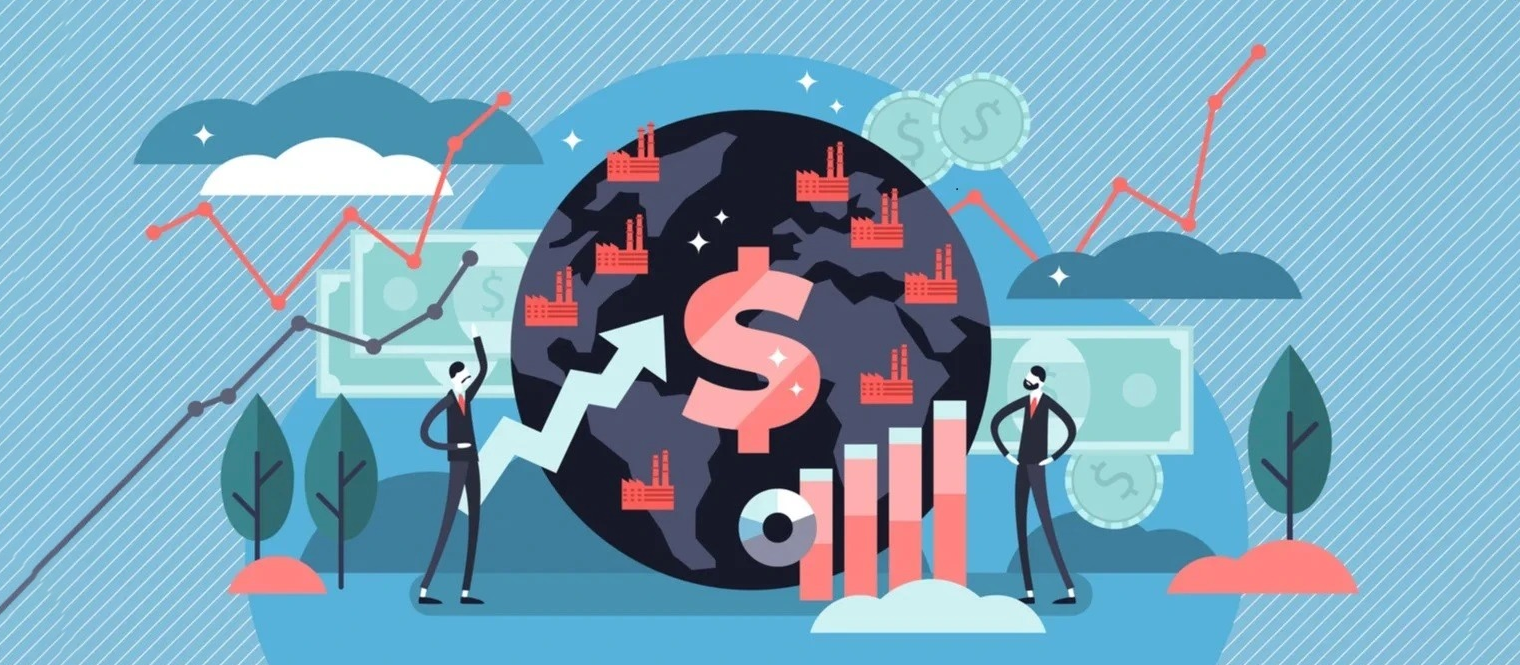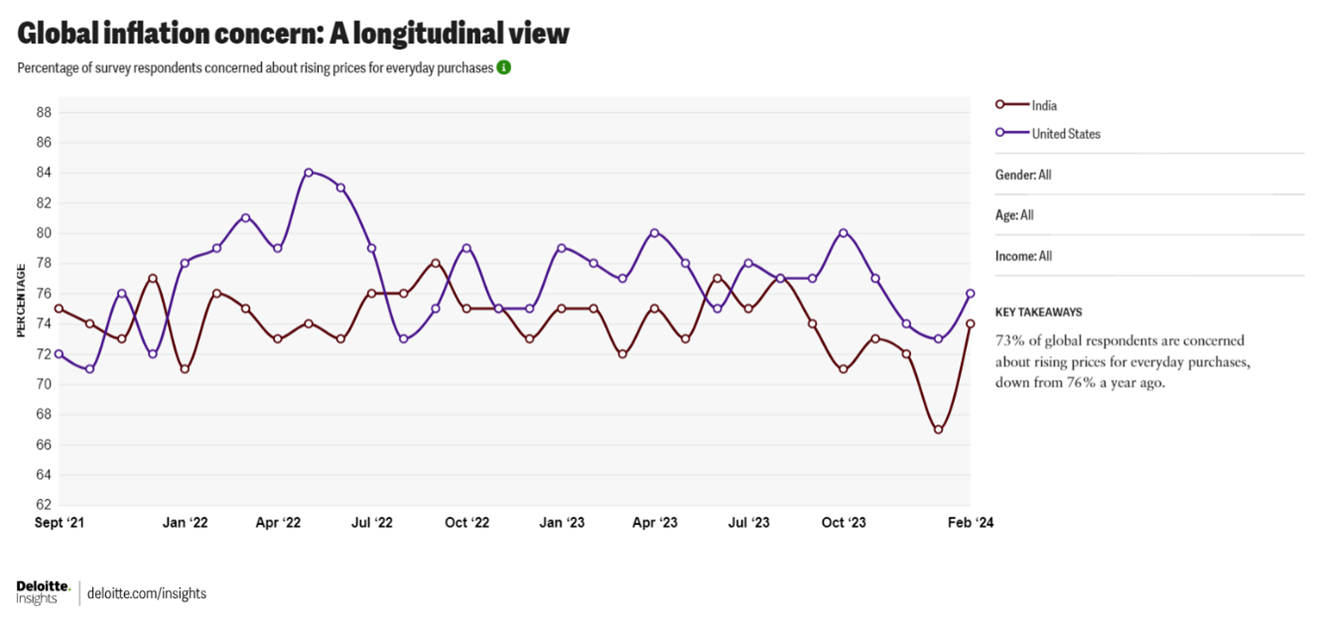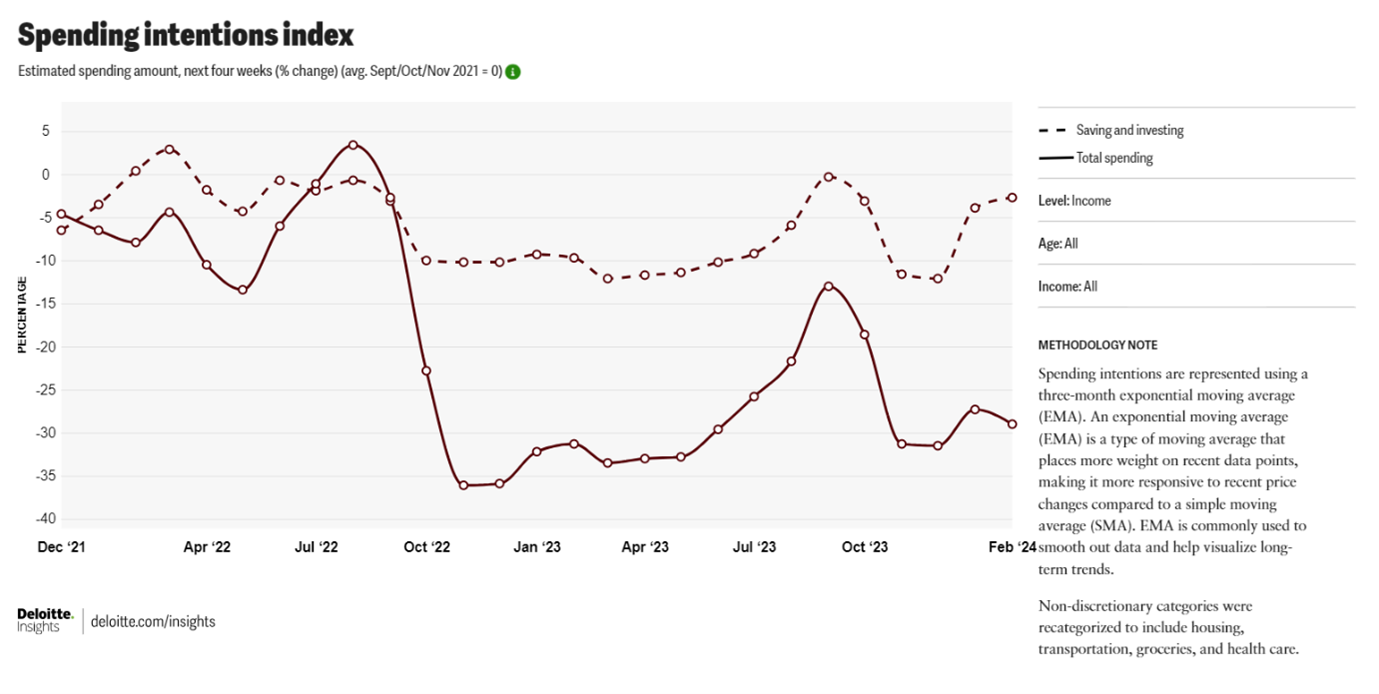

Dr. Padmaja Bhujabal Assistant Professor, School of Business Woxsen University Email: padmaja.bhujabal@woxsen.edu.inMr. Swapnasarit Pradhan Manager, Canara Bank Email: swapnasarit.pradhan6@gmail.com
In today's dynamic economic landscape, consumer behaviour is continually evolving, shaped by various factors including technological advancements, socio-cultural shifts, and economic trends. Understanding these trends is paramount for businesses to stay competitive and effectively cater to the evolving needs and preferences of their target audience. This white paper explores the interplay between current economic trends and consumer behaviour. It examines how factors like inflation, job security, and overall economic sentiment influence spending habits, brand preferences, and purchasing decisions. By analysing recent data and research findings, we highlight key patterns and phenomena shaping consumer decision-making processes. The paper also discusses the rise of value-conscious consumers and the growing importance of sustainability and experience in the current market. Furthermore, we explore the implications of these trends for businesses across industries, offering actionable recommendations to adapt and thrive in this ever-changing environment.
Introduction:
Consumer behaviour is the result of the intricate interaction between psychological, social, and economic variables that influence individuals’ decisions and behaviours in the marketplace. In recent years, rapid technological advancements, globalization, and socio-cultural shifts have significantly transformed consumer behaviour, presenting both challenges and opportunities for businesses worldwide. Consumer behaviour is a dynamic force that shapes markets and drives economic growth. Understanding how economic trends influence consumer choices is crucial for businesses and policymakers alike. This white paper delves into the key economic factors currently impacting consumer behaviour.
Rising prices are a major concern for consumers globally. This leads to a shift towards essential goods and a focus on value for money. Deloitte's Consumer spending behaviour and drivers report highlights that 73% of respondents are worried about rising prices [1]. This has been highlighted in the Figure 1 below.

Figure 1: Concern of respondents to inflation, India and United States (September 2021-February 2024)
Source: ConsumerSignals - Consumer spending behavior and drivers | Deloitte Insights
Consumer confidence is often tied to job security. Uncertain economic conditions can lead to increased caution and a decrease in discretionary spending. Overall economic outlook significantly impacts consumer behaviour. A positive outlook encourages spending, while a negative outlook leads to saving and delayed purchases. Figure 2 shows the spending and saving intentions of the consumers in India. We can see an increasing intention to save and invest and a decreasing intent to spend, which can be due to the growing inflation and other economic uncertainties.

Figure 2: Saving and spending intentions of consumers, India (December 2021-February 2024)
Source: ConsumerSignals - Consumer spending behavior and drivers | Deloitte Insights
Economic Trends Impacting Consumer Behaviour:
These economic trends are leading to several key shifts in consumer behaviour. Consumers are becoming more price-sensitive, seeking discounts, promotions, and private label brands. They are also focusing on reducing waste and maximizing the use of products they purchase. Along with that, consumers are beginning to place a higher value on experiences than material goods. This trend is fuelled by a desire for connection, personal growth, and creating memories. In addition to that, environmental concerns are influencing purchasing decisions. Consumers are more likely to choose sustainable brands and products with eco-friendly packaging.
Economic Uncertainty and Consumer Confidence:
Economic uncertainty and consumer confidence are intricately linked aspects of the broader economic landscape, exerting significant influence on consumer behaviour and market dynamics. Here, we delve deeper into the relationship between economic uncertainty, consumer confidence, and their implications for businesses:
Economic Uncertainty:
Economic uncertainty refers to the lack of predictability or confidence regarding future economic conditions. It often arises due to various factors such as geopolitical tensions, policy changes, natural disasters, or economic downturns. Uncertain economic environments make it challenging for businesses and consumers to forecast future outcomes accurately. Moreover, factors contributing to economic uncertainty can vary widely. Geopolitical events such as trade disputes or conflicts, financial market volatility, regulatory changes, and unexpected shocks like the COVID-19 pandemic can all contribute to heightened uncertainty.
Economic uncertainty poses several challenges for businesses, including reduced investment and hiring, increased risk aversion, and disrupted supply chains. Businesses may delay expansion plans or capital investments until the economic outlook becomes clearer, impacting overall growth and profitability. Businesses can employ various strategies to mitigate the impact of economic uncertainty. These may include maintaining financial flexibility, diversifying revenue streams, closely monitoring market trends, and enhancing agility in response to changing economic conditions.
Consumer Confidence:
Consumer confidence is a measure of how optimistic or pessimistic people are about their own financial circumstances and the status of the economy as a whole. While low confidence can result in decreased consumer spending and an economic downturn, high consumer confidence is generally associated with increasing spending and economic growth. Also, it is influenced by a multitude of factors, including employment levels, income growth, inflation rates, stock market performance, and perceptions of future economic prospects. Positive developments in these areas tend to bolster consumer confidence, while negative trends can erode confidence levels.
Consumer confidence plays a pivotal role in shaping consumption patterns. When consumers feel optimistic about the economy and their financial prospects, they are more likely to increase discretionary spending on non-essential goods and services. Conversely, declining confidence may prompt consumers to cut back on spending and prioritize essential purchases. Businesses closely monitor these indicators as they provide valuable insights into future demand trends. High consumer confidence can signal opportunities for businesses to expand market share and introduce new products, while declining confidence may necessitate adjustments to pricing, marketing strategies, or product offerings.
Implications for Businesses:
Businesses need to adapt their strategies to these changing consumer behaviors. They should regularly monitor key economic indicators, including consumer confidence indices, unemployment rates, and GDP growth, to gauge the prevailing economic environment accurately. In response to changing economic conditions, businesses may need to adapt their strategies accordingly. This could involve adjusting pricing strategies, optimizing inventory levels, reallocating resources, or diversifying product offerings to align with shifting consumer preferences. Highlighting product value propositions, offering competitive pricing, and providing loyalty programs can attract cost-conscious consumers.
Building resilience and flexibility into business operations can help mitigate the adverse effects of economic uncertainty. This may involve maintaining healthy cash reserves, fostering strong customer relationships, investing in innovation, and cultivating a culture of adaptability within the organization. Additionally, advertising eco-friendly products and incorporating sustainable practices throughout the supply chain might appeal to customers who are concerned about the environment.
Conclusion:
In conclusion, understanding current economic trends is essential for businesses to navigate the complex landscape of consumer behaviour successfully. By embracing digital transformation, sustainability, and personalized experiences, organizations can not only adapt to evolving consumer preferences but also gain a competitive edge in today's dynamic marketplace. For businesses seeking to thrive in the ever-evolving consumer landscape, staying abreast of economic trends and leveraging insights from this whitepaper can provide a roadmap for strategic decision-making and sustainable growth in the years to come.
References:
1. ConsumerSignals - Consumer spending behavior and drivers | Deloitte Insights (March, 2024) Link: https://www2.deloitte.com/us/en/insights/industry/retail-distribution/consumer-behavior-trends-state-of-the-consumer-tracker.html#retail-consumer-products